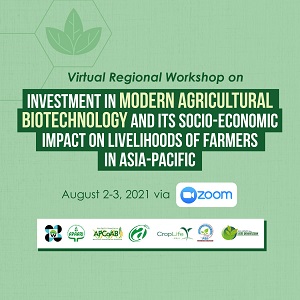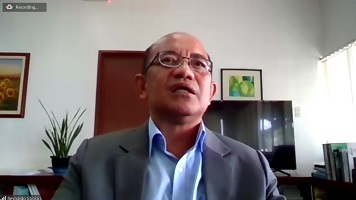 The Philippine Council for Agriculture, Aquatic and Natural Resources Research and Development of the Department of Science and Technology (DOST-PCAARRD) sees biotechnology as one of the means to achieve food safety and food security.
The Philippine Council for Agriculture, Aquatic and Natural Resources Research and Development of the Department of Science and Technology (DOST-PCAARRD) sees biotechnology as one of the means to achieve food safety and food security.
With this, the Council co-organized the “Virtual Regional Workshop on Investment in Modern Agricultural Biotechnology and its Socio-economic Impact on Livelihoods of Farmers in Asia Pacific,” with the Asia-Pacific Association of Agricultural Research Institutions (APAARI) under its program, Asia-Pacific Consortium on Agricultural Biotechnology and Bioresources (APCoAB). The virtual workshop was also in collaboration with the Council of Agricultural (COA) Taiwan, ROC; CropLife Asia (CLA), Singapore; and Federation of Seed Industry of India (FSII), India. It was held on August 2 and 3, 2021 via video conferencing.
According to DOST-PCAARRD Executive Director Reynaldo V. Ebora, the Council is supporting two research initiatives on crop modern biotechnology: capacity building for gene editing using CRISPR-Cas 9 and the new breeding techniques for eggplant.
Dr. Ebora also shared the recent milestones of the Philippines in the field of biotechnology. “Just last week, the International Service for the Acquisition of Agri-biotech Applications (ISAAA) reported that the Philippine government has approved BT eggplant event ‘EE-1’ for direct use as food, feed, or for processing (FFP). Meanwhile, the golden rice developed by the Philippine Rice Research Institute (PhilRice) and the International Rice Research Institute (IRRI) has been cleared very recently for commercial propagation,” he said.
Being a Council for the advancement of research and development in the agriculture, aquatic, and natural resources (AANR) sector, Dr. Ebora assures that DOST-PCAARRD will steadily provide science and technology solutions to support biotechnology in the country.
A venue for experience and idea sharing
 The virtual workshop enabled Asia Pacific countries to share their ideas, innovations, recommendations, and experiences in investing in modern biotechnology.
The virtual workshop enabled Asia Pacific countries to share their ideas, innovations, recommendations, and experiences in investing in modern biotechnology.
The technical session held on day 1 had two sub-sessions: investment status and impacts in modern agricultural biotechnology, and case studies highlighting investment and impact.
Case studies featured the success of Bt Brinjal in Bangladesh, discussed by Dr. M.A. Yousuf Akhond of Bangladesh Agricultural Research Institute; Bt cotton in Asia, presented by Dr. Charudatta D. Mayee, President of the South Asia Biotechnology Centre; investment and impact of GM maize in the Philippines, presented by Dr. Leonardo A. Gonzales of SIKAP/STRIVE, INC.; impact of using biotech corn in Vietnam, discussed by Graham Brookes of PG Economics Ltd UK and Tran Xuan Dinh; GM canola in Australia: impacts and prospects,presented by Osman Mewett, Chief Executive Officer of the Australian Seed Federation; and regulatory policy and impact to investment: case of Argentina, presented by Martin Lema of Quilmes National University.
Day 2 had two technical sessions: impacts of enabling policies for enhanced investment and innovative funding mechanisms.
Day 2 technical session featured the topics: policy changes for enhancement of funding in modern agricultural technology, presented by Dr. Saturnina Halos, Chair of the Technical Advisory Group on modern biotechnology and innovations; enabling policies and their impact on genome editing related innovations, discussed by Dr. Szabolcs Ruthner, Regulatory Affairs Manager at International Seed Federation; and regular harmonization approaches to reduce cost of products and facilitate trade, presented by Ms. Laurie Goodwin of CropLife International.
The panel discussion featured the topics: innovative funding mechanisms in national public private partnerships by Dr. Shivendra Bajaj, Executive Director of FSII; consortium approach to public-private partnership for commercializing genome editing in Japan by Dr. Tomiko Yamaguchi of International Christian University with Dr. Mai Tsuda of University of Tsukuba; regional public-private partnership by Dr. Bharat Char, Chief Science Officer of Mahyco Private Limited, India; investment in knowledge management and communication by Dr. Mahaletchumy Arujanan, Global Coordinator of International Service for the Acquisition of Agribiotech Applications (ISAAA); stakeholder-driven funding mechanism, discussed by Dr. Sanjay Saxena, General Manager of Biotechnology Industry Research Assistance Council; and investment in capacity building, awareness, and policy advocacy, presented by Rhodora Romero-Aldemita, Director of ISAAA SEAsia Center and Global Knowledge Center on Crop Biotechnology.
Despite several challenges faced by the agricultural sector in attaining sustainable production of agricultural products, agricultural biotechnology has continuously provided modern solutions to improve farm productivity, enhance capacities, generate revenues and employment, and promote nutrition security and environmental sustainability.
The virtual regional workshop has broadened the knowledge towards agricultural biotechnology in the region. It also encouraged stakeholders to strengthen their efforts through establishment of harmonized biotechnology policies and regulations across the region, as well as enabling R&D collaborations, capacity building activities, and investment in knowledge management and communication to promote biotechnology and address political and social concerns.
